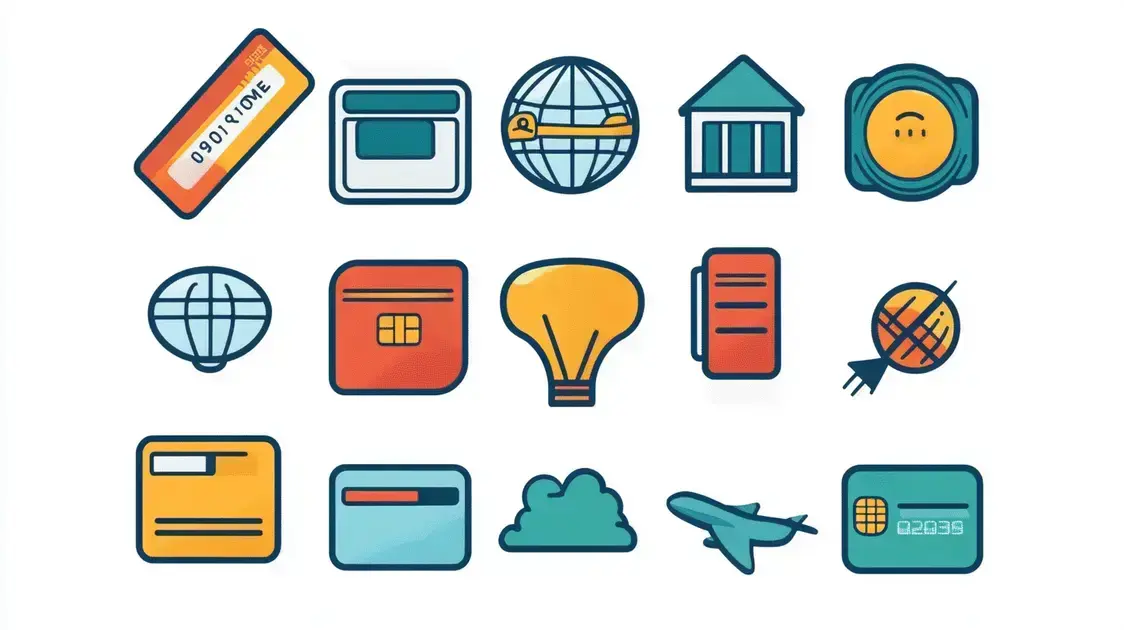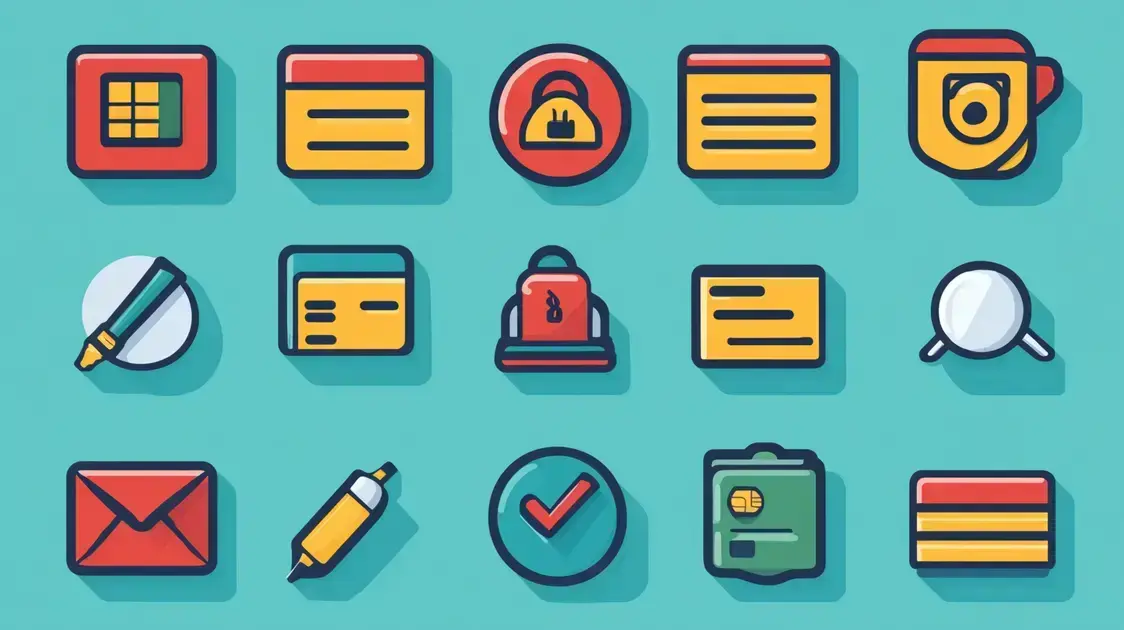ADVERTISEMENT
Applying for a credit card effectively involves checking your credit score, researching options, gathering necessary information, and understanding terms.
Avoid common mistakes like missing payments or carrying high balances to maximise benefits and maintain a healthy financial status.
ADVERTISEMENT
If you’re searching for the best credit card deals, you’ve come to the right place! Knowing how to navigate the complex world of credit cards can help you save money and earn fantastic rewards.
Understanding Credit Card Deals
Understanding credit card deals can make a significant difference in your financial life.
ADVERTISEMENT
Credit card deals are promotional offers that often include attractive rewards, lower interest rates, and other benefits.
Learning how to interpret these deals is essential to making smart financial decisions.
What to Look for in Credit Card Deals
When evaluating credit card deals, consider factors such as the annual percentage rate (APR), the rewards programme, and any fees associated with the card.
Look for introductory offers that provide cash back or points for your initial spending. These features can enhance the value you receive from your credit card.
Understanding Terms and Conditions
Each credit card deal comes with its terms and conditions. It’s crucial to read these carefully. Often, there are stipulations regarding how rewards are earned or how long the introductory periods last. Understanding these terms helps avoid unexpected surprises later on.
The Importance of Credit Score
Your credit score plays a significant role in determining which credit card deals you qualify for.
A higher credit score typically opens up better rewards and lower interest rates.
It’s wise to check your credit score before applying for a new card to understand your eligible options.
Comparing Offers
Lastly, comparing multiple credit card deals can lead you to the best option for your financial situation.
Use online comparison tools and reviews to assess different cards based on their benefits, customer service, and overall reputation.
Types of Credit Card Deals
There are various types of credit card deals available, and understanding them is vital to choosing the right card for your needs.
Here are some common types of credit card deals:
1. Rewards Credit Cards
These cards offer points, miles, or cash back for every purchase you make.
They are ideal for those who want to earn rewards on their spending. Different cards focus on specific categories, such as travel, dining, or groceries.
2. Low-Interest Credit Cards
Low-interest credit cards offer a lower annual percentage rate (APR). This type is great for users who tend to carry a balance and want to pay less in interest over time.
3. Balance Transfer Credit Cards
These cards allow you to transfer an existing balance from a high-interest credit card to one with a lower interest rate.
Balance transfer deals often include an introductory period with zero or low interest, helping you save on fees.
4. Secured Credit Cards
Secured cards require a cash deposit that acts as your credit limit.
They are perfect for individuals looking to build or rebuild their credit history.
5. Student Credit Cards
Designed for students, these cards typically have lower credit limits and may offer rewards or cash back on certain purchases.
They help first-time users manage their finances responsibly.
6. Business Credit Cards
Tailored for business use, these cards can offer rewards for business-related purchases.
They may also provide tools for tracking expenses and managing business cash flow.
7. Premium Credit Cards
These cards often come with higher annual fees but provide luxury benefits, such as travel perks, concierge services, and extensive rewards programmes.
Each type of credit card deal comes with its own set of benefits and considerations.
Choosing the right one depends on your spending habits and financial goals.
How to Choose the Best Credit Card

Choosing the best credit card can feel overwhelming.
However, by following a few simple steps, you can identify the right card for your financial needs.
1. Assess Your Spending Habits
Understanding how and where you spend money is the first step in choosing a credit card. Do you travel frequently? Consider a rewards card that offers travel points.
If you mainly use your card for groceries, look for cards that provide cash back on supermarket purchases.
2. Check Your Credit Score
Your credit score significantly influences the types of credit cards you can apply for.
Ensure you know your credit score and aim for cards that match your credit profile.
A higher score typically provides access to better rewards and lower interest rates.
3. Compare Fees and Rates
Each credit card comes with its own fees, such as annual fees, late payment fees, and foreign transaction fees.
Take the time to read the fine print and compare the costs associated with each card to find one that is financially advantageous.
4. Look for Sign-Up Bonuses
Many credit cards offer attractive sign-up bonuses for new customers. These bonuses can include cash back, points, or other rewards that can add significant value.
Evaluate whether these bonuses align with your spending habits.
5. Read Reviews and Ratings
Checking reviews from other consumers can offer insight into the advantages and disadvantages of specific credit cards.
Look for feedback on customer service, ease of use, and satisfaction levels.
6. Consider Additional Benefits
Some credit cards come with perks, such as travel insurance, purchase protection, or rewards programmes.
Assess these additional benefits and consider how they fit into your lifestyle.
7. Know Your Limitations
Before applying, ensure you can manage a credit card responsibly. This means paying your balance in full each month to avoid debt.
Knowing your limits helps you choose a card that you can use effectively without getting into financial trouble.
Comparing Credit Card Deals
Comparing credit card deals is a crucial step in finding the right card for your financial needs.
By evaluating different offers, you can identify which card provides the best benefits for your lifestyle.
1. Create a List of Options
Start by gathering a list of credit card deals that interest you. Use comparison websites or financial institutions’ websites to find various offers.
It’s important to include both rewards and low-interest cards for a broad overview.
2. Compare Key Features
When comparing credit card deals, focus on key features such as:
- Annual Percentage Rate (APR): This is the interest rate you’ll pay on any outstanding balance. A lower APR is generally preferable.
- Rewards Programme: Some cards offer cash back, while others provide points or travel rewards. Choose a programme that aligns with your spending habits.
- Fees: Look for annual fees, late payment fees, and foreign transaction fees. A card with fewer fees can save you money.
3. Use a Comparison Chart
A comparison chart can help visualise the differences between credit card deals.
Include columns for each feature you want to compare, making it easier to see which cards stand out.
4. Research Customer Reviews
Customer reviews can provide insights into a credit card’s performance and customer service.
Look for reviews that mention ease of use, rewards redemption, and satisfaction levels.
5. Consider Introductory Offers
Some credit cards come with special introductory offers, such as bonus points or cash back for the first few months. Be sure to factor these into your comparison.
6. Evaluate Long-Term Value
While introductory offers are attractive, also consider the long-term value of each credit card.
Evaluate how rewards accumulate over time and if the card fits your future financial plans.
7. Make an Informed Decision
After thorough comparisons, choose the card that best meets your needs. Think about your spending habits, tolerance for fees, and overall financial goals.
Top Credit Card Deals of 2023
The top credit card deals of 2023 offer great rewards, low-interest rates, and impressive sign-up bonuses.
Here are some standout options you should consider:
1. Cash Back Credit Cards
These cards allow you to earn back a percentage of your purchases.
For instance, the Card A offers up to 5% cash back on select categories like groceries and fuel.
This is ideal for everyday spenders who want to maximise their earnings.
2. Travel Rewards Credit Cards
If you love travelling, Card B is a great choice.
It provides 3 points for every rand spent on travel purchases and a generous sign-up bonus of 50,000 points after your first purchase.
These points can be redeemed for free flights or hotel stays.
3. Low-Interest Rate Cards
For those who sometimes carry a balance, Card C comes with an introductory interest rate of just 0% for the first 12 months.
After that, the ongoing rate remains competitive, making it easier to pay down existing debt without high interest.
4. Secured Credit Cards
Card D is a fantastic option for individuals building or rebuilding their credit.
It requires a deposit that acts as your credit limit, all while offering rewards on purchases to help you improve your credit score.
5. Premium Credit Cards
Offering luxury benefits, Card E includes perks like lounge access at airports, comprehensive travel insurance, and rewards on every purchase.
This card typically has a higher annual fee but is worth it for frequent travellers looking for extra comforts.
6. Student Credit Cards
Card F is specially designed for students, providing them with responsible credit use while offering a low credit limit and rewards for spending.
It’s a safe way to start building credit history.
These top credit card deals of 2023 cater to various needs and spending habits. Be sure to assess your financial goals to choose the best one for you.
Benefits of Using Credit Cards

Using credit cards provides several benefits that can enhance your financial management and overall lifestyle. Here are some key advantages of using credit cards:
1. Convenience
Credit cards are easy to use and accepted at most places. They eliminate the need to carry cash, making transactions quicker and more convenient.
2. Rewards and Cash Back
Many credit cards offer rewards points or cash back for purchases.
You can earn valuable rewards, such as discounts on travel, gift cards, or even cashback on purchases, helping you save money over time.
3. Building Credit History
Using a credit card responsibly can help build your credit history.
A positive credit history is essential for obtaining loans, mortgages, and other financial products in the future. Timely payments can improve your credit score.
4. Purchase Protection
Credit cards often come with built-in purchase protection, which can cover losses or damages for eligible purchases.
This feature can be an excellent safeguard, especially for expensive items.
5. Emergency Funding
In case of unexpected expenses or emergencies, credit cards provide quick access to funds.
This can be helpful for covering urgent repairs or medical expenses without needing to dip into savings.
6. Fraud Protection
Most credit cards offer strong fraud protection.
If your card is lost or stolen, you can report it immediately, and you’ll typically be protected from unauthorized charges, freeing you from financial liability.
7. Travel Benefits
Many credit cards provide travel-related perks, such as travel insurance, no foreign transaction fees, and airport lounge access.
These benefits can enhance your travel experiences and offer added value.
8. Budgeting Tools
Credit card statements provide detailed records of your spending habits.
This information can help you budget effectively and track your expenses, allowing for better financial planning.
Tips for Maximising Credit Card Rewards
Maximising your credit card rewards can help you get the most out of your spending. Here are some effective tips to enhance your rewards experience:
1. Know Your Card’s Rewards Structure
Each credit card offers different ways to earn rewards. Familiarise yourself with the categories where you earn the most points or cash back.
For example, some cards may offer higher rewards on groceries, gas, or travel.
2. Use Your Credit Card for Everyday Purchases
Make the most of your rewards by using your credit card for everyday purchases. This includes groceries, dining out, and online shopping.
Just ensure you can pay the balance in full each month to avoid interest charges.
3. Take Advantage of Bonus Categories
Many credit cards offer rotating bonus categories that change every quarter.
Sign up for these special categories and remember to use your card for purchases in those areas to maximise your rewards.
4. Pay Your Balance in Full
To fully benefit from credit card rewards, aim to pay off your balance each month.
This way, you avoid interest charges and ensure that your rewards are truly earning you extra value.
5. Use Rewards from Partner Merchants
Some credit cards have partnerships with certain retailers.
Shopping at these partner merchants can yield additional rewards, so always check for special offers before making a purchase.
6. Monitor Promotional Offers
Keep an eye on limited-time offers and promotions from your credit card provider.
Some cards offer extra rewards during certain times of the year or on specific spending thresholds.
7. Redeem Rewards Wisely
Take the time to understand the best ways to redeem your rewards.
Some redemption options may offer greater value, such as travel bookings, while others may provide less benefit. Choose wisely to maximise your returns.
8. Consider Multiple Cards
Using more than one credit card strategically can help maximise your rewards.
For instance, you could use one card for gas and another for dining, allowing you to earn the best rewards in each category.
Applying for a Credit Card
When you decide to apply for a credit card, it’s important to follow specific steps to ensure a smooth application process.
Here are the essential steps for applying for a credit card:
1. Check Your Credit Score
Before applying, check your credit score. This will help you understand which credit cards you may qualify for.
A higher credit score typically opens up access to better cards with more benefits.
2. Research Credit Card Options
Take the time to explore various credit card offers. Compare their features, such as rewards programmes, interest rates, and fees.
Look for a card that aligns with your spending habits and financial goals.
3. Gather Necessary Information
When applying, you will need to provide personal information, including your name, address, income, and employment details.
Having this information ready will streamline the application process.
4. Complete the Application
You can apply for a credit card online, over the phone, or in person at a bank. Fill out the application form accurately to avoid any delays.
Ensure that all your information is correct before submitting.
5. Understand the Terms and Conditions
Before finalising your application, carefully read the terms and conditions of the card.
Pay attention to the interest rates, fees, rewards structure, and any introductory offers. This knowledge will help you make an informed decision.
6. Submit Your Application
After completing the application, submit it. If applying online, you may receive a decision quickly.
If applying via mail or in person, it may take longer to process.
7. Monitor Your Application Status
After submitting, keep an eye on your application status. Some credit card companies provide tracking options online.
If you don’t hear back in a reasonable time, follow up to check on your application.
8. Activate Your Card
If approved, your credit card will arrive by mail. Follow the instructions to activate your card.
Once active, you can start using it responsibly to benefit from the rewards and features it offers.
Common Mistakes to Avoid with Credit Cards

Avoiding common mistakes when using credit cards can help you maintain a healthy financial status. Here are some frequent pitfalls to steer clear of:
1. Missing Payments
One of the most common mistakes is missing a payment deadline. Late payments can lead to additional fees and higher interest rates.
Set reminders or automate your payments to avoid this issue.
2. Carrying a High Balance
Carrying a balance close to your credit limit can negatively affect your credit score.
It’s best to keep your balance low, ideally below 30% of your available credit, to manage your credit usage effectively.
3. Ignoring Fees
Various fees can come with credit cards, including annual fees and late payment fees.
Always read the terms and conditions, and be aware of the costs associated with your card to avoid surprises.
4. Not Using Rewards Wisely
Some individuals overlook the rewards and perks their credit cards offer.
Familiarise yourself with how to earn and redeem rewards effectively to take full advantage of all benefits available.
5. Applying for Too Many Cards
Submitting multiple applications for credit cards in a short period can harm your credit score.
Too many inquiries can signal risk to lenders, so apply only for cards that you really need.
6. Paying Only the Minimum
Making only the minimum payment can lead to accumulating debt due to high-interest rates.
Strive to pay off your balance in full each month to avoid interest charges and maintain financial health.
7. Neglecting to Check Statements
Not reviewing your credit card statements regularly can result in missed charges or fraud.
Always monitor your statements for accuracy and report any discrepancies immediately.
8. Using Credit Cards for Cash Withdrawals
Using your credit card for cash withdrawals can incur high fees and interest rates.
It’s best to use credit cards for purchases rather than cash advances to avoid unnecessary costs.





